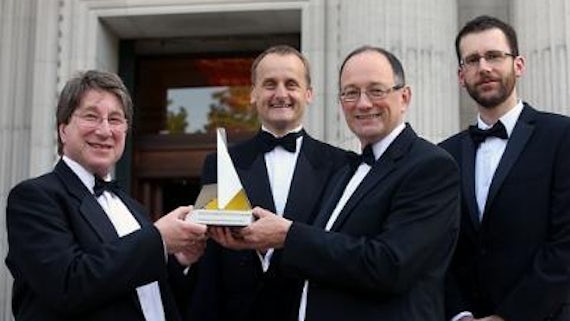Medical Breakthrough Award
2 Mehefin 2014

A study which led to major changes in the treatment of prostate cancer, and researchers who identified a new gene causing an inherited form of bowel cancer, have jointly won the Medical Breakthrough prize at this year's Cardiff University Innovation and Impact Awards.
The award, for the identification, translation and commercialisation of the first gene for recessive predisposition to bowel cancer (MUTYH), was presented to Professor Malcolm Mason, Matt Sydes (Medical Research Council) and Professor Julian Sampson by David Baynes, Director of IP Group Plc.
The researchers discovered a gene, MUTYH, that, when damaged, leads to a risk of over 80% of bowel cancer. The findings allowed the team to develop tests to screen relatives for pre-malignant signs of the disease at which point curative treatment is the norm. The tests have since been licensed and rolled out across the world.
Led by Professors Julian Sampson and Jeremy Cheadle, the research improved genetic counselling, genetic testing and bowel cancer prevention in colorectal cancer worldwide, and led to more efficient targeting of colonoscopic screening services to high risk patients.
Professor Sampson said: "Without screening and preventative surgery, individuals who inherited this faulty gene from their parents would have gone on to develop bowel cancer."
"The siblings of those affected by this inherited form of bowel cancer were at a one-in-four risk of developing bowel cancer themselves. But prior to development of the gene test family members usually had no idea they were also at very high risk"
Now, clinicians can use a diagnostic test for particular mutations of MUTYH to screen families of patients with bowel cancer, allowing doctors to remove the affected part of the bowel before tumours become malignant.
Professor Jeremy Cheadle said: "The work has had significant commercial impact. MUTYH gene testing is now carried out by at least 84 state and private sector diagnostic laboratories in Europe, and at centres in Australasia. In North America, the University has taken out patents and has licenced intellectual property rights to a US company, Myriad Genetics Inc, generating income of about a third of a million pounds for Cardiff University in royalties."
More than 11,000 patient samples have been tested internationally for MUTYH mutation since the gene was discovered, generating income of around $5m in licence fees for Myriad.
Professor Sampson added: "The changes in clinical genetics, bowel screening and treatment practice based on our research have been incorporated into guidelines published by specialist societies and expert groups in the UK, Europe, North America and Australasia."